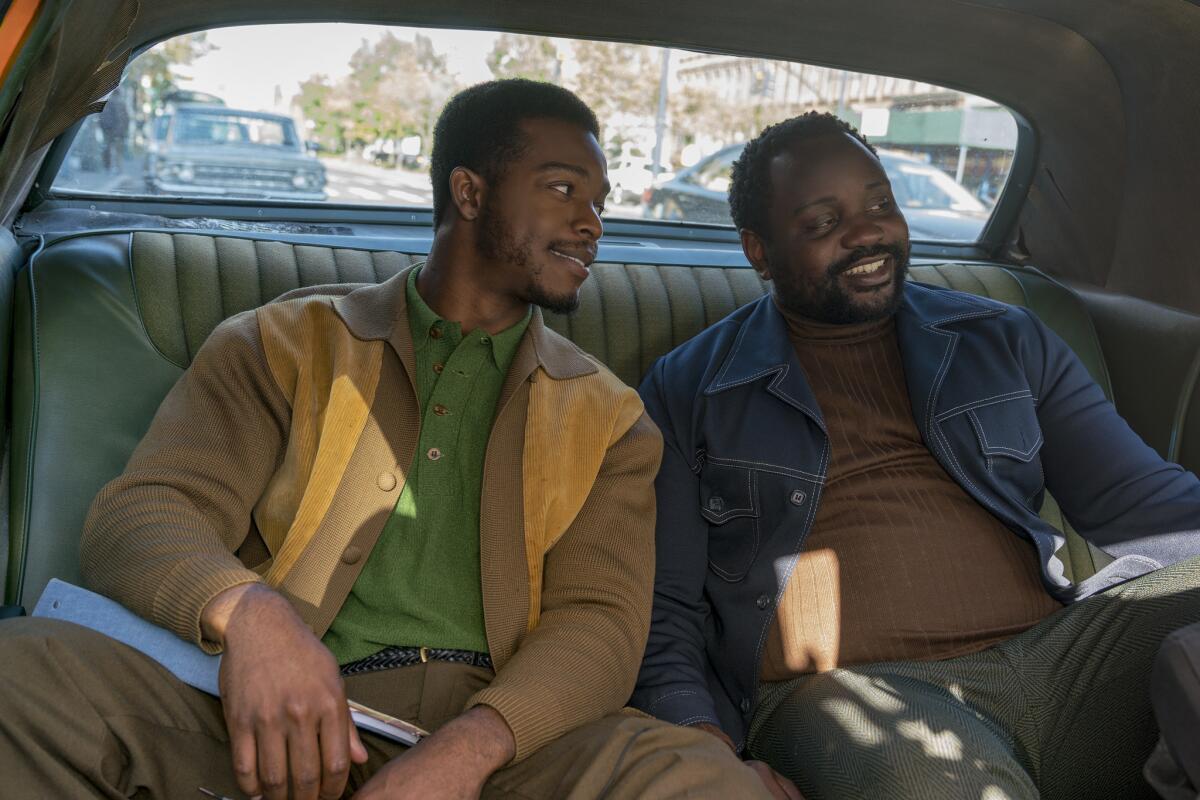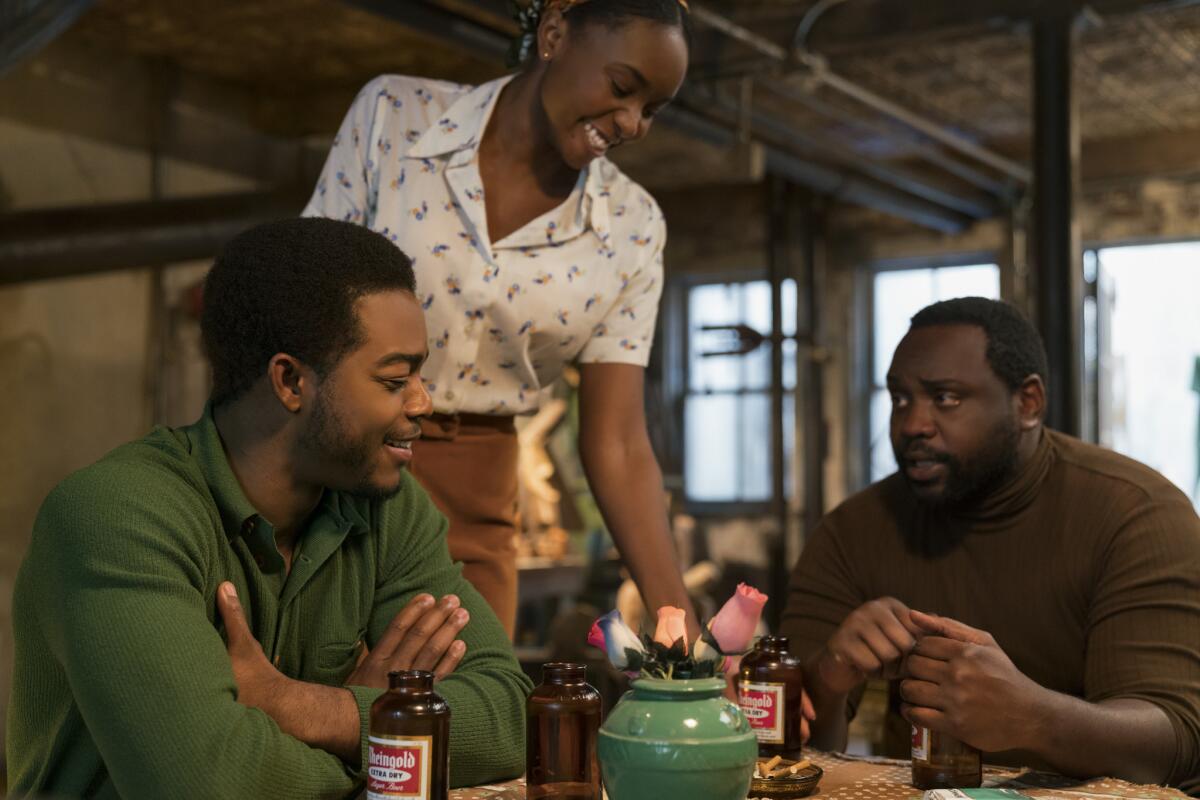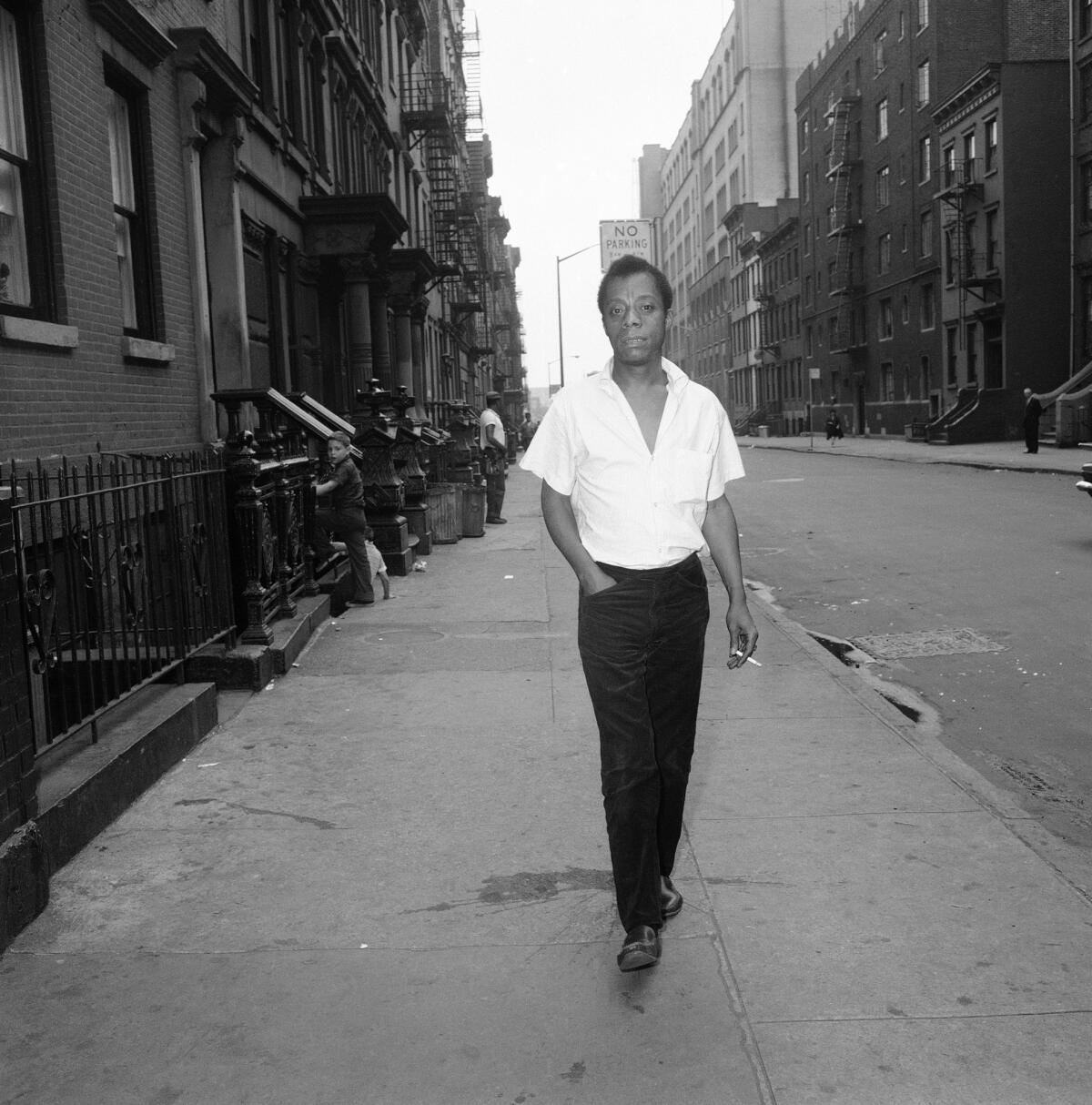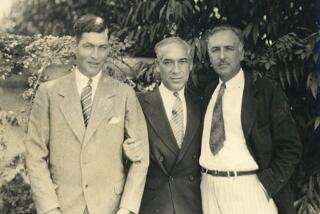Why the conversations between black men in ‘If Beale Street Could Talk’ feel so rare

If you grew up in a black neighborhood, to view Barry Jenkins’ film adaptation of James Baldwin’s “If Beale Street Could Talk” feels more real than life.
My neighborhood was the world to me. But I had this sense that there was something more out there — that maybe my life was deficient. Only later did I realize the abundance that was there in front of me.
I was born in New Orleans, but home was where I grew up — in Los Angeles’ Jefferson Park, a largely middle-class black neighborhood where the man next door owned a Jaguar repair business and the neighbor next to him was a expert carpenter, as was Mr. Baggett behind us.
These were my father’s friends, all black men who had served in World War II. Like the fathers of Fonny and Tish, the young, almost preternaturally beautiful couple at the heart of “If Beale Street Could Talk,” they were good men looking out for their families. Contrary to the storyline of so many other Hollywood movies, black men in my neighborhood weren’t ghosts who deserted their families en masse. Black life was as varied as life is.
I bought comics from the Five and Dime pharmacy on Jefferson run by a Japanese American man and a black woman named Beulah Mae. I remember the amazing Holiday Bowl on Crenshaw where you could get grits and hot links and sashimi under one roof.
I didn’t notice that the only white people I knew were teachers and one red-headed girl who went to Dorsey High School with me and was friends with my girlfriend. She didn’t last long, and soon there were no white students.
I didn’t know white people my age until I went to college at UC Santa Barbara. UCSB was very white, but soon I had black roommates, dated black women and eventually married a black woman who had been the president of Alpha Phi Alpha sorority.
The mid-’70s, before I left for college, was a great time to be a black teenager. I had close friends who were athletes and broad-minded readers who were easy to hang with. But one of my friends, a big-hearted, overweight loser with a wicked sense of humor, was always on the verge of disaster. The way he lived, recklessly getting into trouble with a massive sense of joie de vivre, was a cautionary tale for me. Still, I envied him. And I never forgot him — I even wrote a novel about him — but I didn’t want to be him. I didn’t want to go to jail. He went to jail frequently.
When I came back from college to teach high school, rock cocaine had exploded and the corruption it generated reached us all. That’s when I felt myself turning inward, away from my neighborhood and even my family, because I had started my own family and had a baby girl to protect. Later, when Rodney King’s near lynching set Los Angeles on fire, many black folk moved back to where their families originally came from — New Orleans, Atlanta, Houston. I moved across town to the edge of Los Angeles County, to Altadena.
I was so terrified about police and prison that I became very risk-adverse — probably more than I needed to be — and even more so after visiting my brother in prison. My brother wasn’t a gangster or wife beater. He was like many black, brown and white people — sprung on cocaine.

‘If Beale Street Could Talk’: Barry Jenkins on staying faithful to James Baldwin and #MeToo »
In “Beale Street,” not long before Fonny (Stephan James) is falsely accused of rape, Brian Tyree Henry enters the film as Daniel Carty, newly out of prison, and has dinner with the couple. He and Fonny have an intimate conversation about life while Tish is out the apartment. It’s a scene of two black male friends talking in a way that is not often depicted in the movies. (Jenkins’ film actually shows this kind of male friendship a second time, when Fonny and Tish’s fathers get together to discuss the fate of their children.)
Carty’s powerfully restrained depiction of prison life evokes overwhelming grief. Words slowly break free from him as though they have a will of their own and he can’t stop from saying them. He reveals how prison broke him, as it is designed to do. Watching the film, I thought back to my own teenage years. I am sure that prison would have broken me if I had gotten caught with the 5 ounces of weed I brought to high school as a favor to a friend.
Through Carty’s brief soliloquy, everything is revealed about the industrial prison system, where a different kind of slavery shackles men and women of color. Jenkins knows this; indeed he seems to know everything about the tragedy of robbing a people of the possibility to live and love and work without fear.
Jenkins possesses a profound understanding of the complexity of black life, and it’s impossible not to trust him as he unfurls a powerful demonstration of white institutional hostility to black people. But the film is much more than that.
To watch the film is to be suspended in time as tragedy and the reaction to tragedy slowly unfurl and are beaten back by the unbreakable devotion between Fonny and Tish. It is a film as much about hope and transcendent love as it is a political one in that it accurately depicts that even grinding white oppression can’t prevent what is beautiful and specific to black life from being realized.
As beautiful as the film is visually and emotionally, it is still an agony to see Fonny, the handsome self-possessed artist, as he is devoured by America’s Kafkaesque penal system, and as Tish, his fiancée, and their families struggle in their attempts to rescue him from prison. The film creates such a fully realized depiction of Fonny and Tish’s travails that knowledge of Baldwin’s novel doesn’t suspend the fear that Fonny might hang himself in prison or provoke the guards to beat him to death.

The intensity of “If Beale Street Could Talk” jars me back to my own life and choices I made — reasonable decisions, rational choices to give myself the opportunities to live a good life and be as good a parent as my parents had been for me. Of course, what is represented in the film is forced isolation, the state imposing separation from family and friends, not the voluntary separations that sometimes separate black folks from the black life they grew up in.
For the longest time I haven’t had a single close black male friend. Partly, this was because of my own retreat from my childhood neighborhood. And many of my college friends had moved back East or to the South. The men I’m most comfortable with are involved in the arts — usually from the middle or working class — who had a calling more than an ambition to live a life in the arts. My girls have decided to find community elsewhere. My oldest daughter, Giselle, lives and works in D.C. because she wanted to immerse herself in black life, and my second-oldest daughter is following in her footsteps by choosing to attend a historically black college or university.
Lately, though, some members of my family from New Orleans have relocated to Los Angeles, and I’ve found that I’m no longer cut off from my past. It’s a relief as I hear new stories about times long ago as I sit with Josh and his sons, two handsome young black men, and my cousin Greg, a successful actor I never knew until recently, all involved in film. Finally, that grinding sense of isolation is easing. What Fonny and Daniel Carty share, the pleasure of long friendship through brutal separation, I have again.
“The baby cries and cries … like it means to wake the dead,” James Baldwin wrote to end his novel. Jenkins shows us that baby as a young boy visiting his father in prison. Fonny and Tish and their child do survive, but under the weight of institutional incarceration, and we leave the film watching the young family share their vending-machine meal in a prison visiting room. Stunned by the harsh beauty of Jenkins’ transcendent filmmaking, the film stays with me and I am forced to reflect on the choices I’ve made for myself.
More to Read
Only good movies
Get the Indie Focus newsletter, Mark Olsen's weekly guide to the world of cinema.
You may occasionally receive promotional content from the Los Angeles Times.






